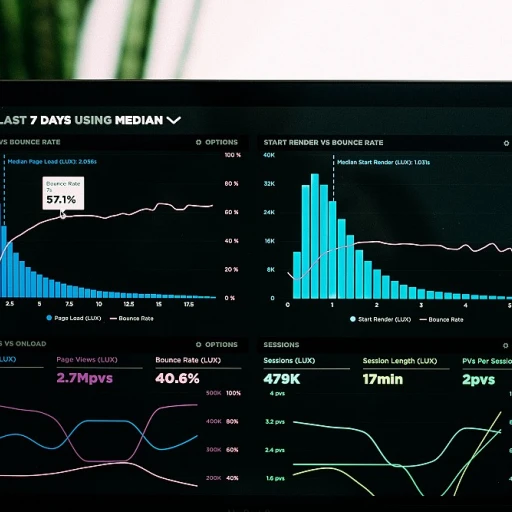
The Role of AI in Modern SEO
Transforming SEO with AI
Artificial Intelligence (AI) is revolutionizing the way brands approach search engine optimization (SEO). As social media platforms like Instagram, TikTok, and YouTube continue to dominate the digital landscape, understanding how AI can enhance SEO strategies is crucial for staying ahead in the competitive world of digital marketing.
AI's role in modern SEO is multifaceted, offering a range of tools and techniques that optimize content and improve user engagement. By analyzing vast amounts of data, AI can identify emerging social media trends and predict shifts in user behavior, allowing brands to tailor their content strategies effectively. This is particularly important as platforms like Instagram Reels and YouTube Shorts gain popularity, requiring brands to adapt to short-form video content.
Moreover, AI-driven SEO strategies can enhance the visibility of user-generated content, which is increasingly influential in shaping brand perception. By leveraging AI, marketers can better understand the nuances of social media interactions, ensuring their content resonates with target audiences across various platforms.
For those interested in delving deeper into how AI is reshaping SEO strategies, exploring the potential of Audience Lab in AI-driven SEO offers valuable insights into the transformative power of AI in this field.
Understanding User Intent with AI
Decoding User Intent with Advanced AI Technology
Understanding user intent is fundamental in optimizing search engine performance. With artificial intelligence, businesses are better equipped to delve deeper into the behaviors and contexts of online interactions. Social media platforms, such as Instagram and TikTok, have clearly demonstrated the shift towards personalized experiences, driving the need to comprehend what users genuinely seek.
As social media trends evolve, the reliance on AI tools to predict user desires is more critical than ever. By employing sophisticated algorithms, AI can analyze vast amounts of data from various social platforms, like LinkedIn and YouTube, to accurately forecast what kind of content attracts particular audiences. This ability is particularly beneficial in formulating marketing strategies that align with current social media trends.
- Analyzing Patterns: AI technology evaluates patterns formed by repeated user actions, such as engagement on Instagram Reels and reaction times on YouTube Shorts. This analysis helps identify content that resonates well with users and prompts brands to create more engaging posts.
- Behavioral Insights: Algorithms assess user interactions, inferring intent based on how users engage with ads or brand-driven content. This is crucial for social media marketing, where understanding short form video popularity or the appeal of influencer marketing can transform strategies.
- Engagement Tracking: Modern AI tools trace and interpret social cues from diverse digital touchpoints, offering brands a chance to adapt to new social media updates swiftly.
In the constantly shifting landscape of social media marketing, it is imperative for brands to stay informed about media trends and user preferences. Advanced AI capabilities not only enhance the understanding of user intent but also prepare brands for adapting to new consumer trends. For a closer look at how businesses can navigate these changes, explore insights available at SocialBiz Magazine.
AI-Driven Content Creation
AI in Crafting Effective Content Strategies
The rapid evolution of social media platforms like TikTok, Instagram, and LinkedIn has ushered in a new era where content creation is central to brand marketing. AI-driven content creation has emerged as a significant tool in this landscape, particularly as social media trends continue to shift towards short form video content like Instagram Reels and YouTube Shorts. Firstly, AI tools now analyze vast amounts of data to generate content ideas that align with current social media trends. This is crucial for brands to remain relevant in an environment where user engagement is heavily influenced by trending topics. AI can source social data to spot emerging trends and cater content that appeals to what users are actively engaged with. In addition to trend analysis, AI also assists in optimizing content for specific platforms. For instance, on TikTok or Instagram, AI-generated content can be crafted into short, engaging video formats that are more likely to capture user attention within the first few seconds. This is vital as online attention spans are notoriously short, with users often spending just a few minutes on a video. A noteworthy aspect of using AI in content generation is its ability to customize content for diverse audiences, enhancing social commerce opportunities. By analyzing user data, AI tools can tailor messaging in ads on social platforms to better resonate with different demographic segments, ultimately driving higher engagement. AI also plays a pivotal role in influencer marketing. By analyzing social media trends and user interactions, AI can identify the most effective influencers for a brand collaboration. Utilizing such AI insights can boost the effectiveness of marketing campaigns and align with current media trends. In summary, AI's capability in generating and optimizing content allows brands to maintain an edge in the fast-paced world of digital marketing. By leveraging AI, brands can create timely and relevant content that aligns with the social preferences of the time, ensuring they capture the attention of their target audience and sustain user engagement across platforms.Predictive Analytics in SEO
Leveraging Predictive Analysis for SEO Success
The landscape of search engine optimization is rapidly changing, and predictive analytics has emerged as a vital tool in adapting to these evolutions. As marketing strategies become increasingly data-driven, the ability to predict user behavior and search trends can offer a significant competitive advantage. Predictive analytics in SEO harnesses machine learning and AI technologies to analyze large sets of social media and search data. Through this sophisticated analysis, brands can anticipate which keywords and topics are likely to trend, and adjust their content strategies accordingly. For example, understanding how users engage with platforms like Instagram, TikTok, LinkedIn, and YouTube can provide insights into which types of content will likely resonate best, be it video, posts, or social media updates. Here are a few ways predictive analytics is reshaping SEO:- Trend Forecasting: By examining historical and real-time data across social platforms, marketers can predict the emergence of social media trends. This allows brands to align their content, including short form videos like Instagram Reels and YouTube Shorts, with these trends to increase engagement.
- User Intent Analysis: Predictive analytics helps decipher what users are searching for and why. By understanding user intent, content creators can craft more targeted and relevant SEO strategies that cater to specific audience needs across platforms like social media and e-commerce.
- Optimizing Content Creation: Leveraging data-driven insights helps fine-tune content marketing efforts. This involves crafting posts that are more likely to attract attention and drive traffic, such as those seen in influencer marketing campaigns.
- Social Commerce Insights: As brands harness the power of social commerce, predictive analytics aids in predicting purchasing trends, enabling businesses to tailor their marketing efforts effectively.
AI and Voice Search Optimization
Enhancing Search Strategies with Voice Search
As social media marketing evolves, brands are realizing the importance of adapting their search engine optimization strategies to accommodate the increasing prominence of voice search. With the advent of voice-activated applications and devices, users are finding voice search more convenient, allowing them to perform searches in real-time, often while multitasking. This requires a shift in how businesses approach their SEO, especially concerning the content marketing strategies they employ across platforms like TikTok, Instagram, and YouTube. Using AI to optimize for voice search involves several key aspects that brands should pay attention to:- Conversational Queries: Voice search queries differ significantly from traditional text-based searches. They are often longer and more conversational. AI-powered tools help brands understand these patterns, creating content that matches user intent and covers a broader range of search queries.
- Focus on Natural Language: Incorporating natural language processing (NLP) technologies, AI analyzes and understands the nuances of human language. This allows brands to create social content, such as Instagram Reels and YouTube Shorts, that resonates with users and aligns well with search engines' algorithms.
- Local Search Optimization: Many voice searches are locally focused, often with "near me" included in the query. AI enables brands to tailor their content to capitalize on these trends, making it easier for potential customers to find relevant social media updates and brand information based on their location.
- Content Accessibility: Voice search makes technology more accessible to people with disabilities or those who prefer auditory information. AI can help brands optimize their media platforms, ensuring content is friendly for all users.
Ethical Considerations in AI-Driven SEO
The Impact of AI on Ethical SEO Practices
The integration of artificial intelligence into search engine optimization has brought about a variety of improvements in efficiency and effectiveness. However, it is crucial to bear in mind the ethical considerations that accompany the use of AI in order to maintain transparency and trust. As brands and social media platforms like Instagram and TikTok harness AI for marketing and content creation, this digital revolution calls for a careful approach.- Transparency: Users expect honesty and transparency from brands and platforms. With the use of AI in content creation and optimization, the origin of content, whether user-generated or AI-driven, must be clear. Fostering authenticity in generated content can boost confidence in the brand.
- Privacy: AI's ability to analyze vast amounts of data, such as user preferences on platforms like Instagram Reels or consumer behavior on social commerce sites, raises questions about data privacy. Users need assurances that their data is handled safely and ethically.
- Bias and Fairness: AI algorithms might inadvertently reinforce existing biases, leading to skewed content recommendations or marketing strategies on social media platforms. Continual assessment and adjustment of AI models ensure a fair and inclusive approach.
- Accountability: As AI takes a more significant role in SEO practices, accountability becomes paramount. Clear policies must be established regarding who takes responsibility for AI-driven decisions and outcomes on platforms such as LinkedIn and YouTube.
- Balancing AI and Human Touch: While AI can handle large volumes of data and assist in content creation, the human element remains essential. Brand interactions that lack human touch or empathy can fail to engage users meaningfully, especially on social platforms where authenticity is a key to success.













